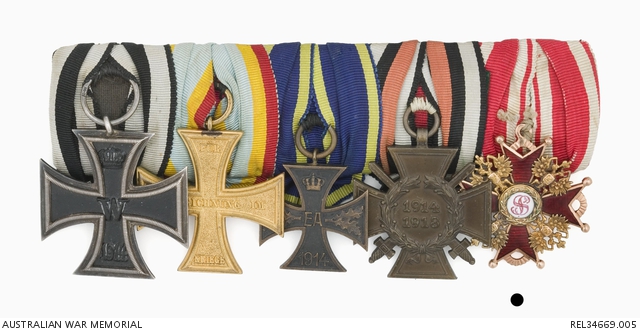| Places | |
|---|---|
| Accession Number | REL34669.005 |
| Collection type | Heraldry |
| Object type | Medal |
| Physical description | Enamel, Gold |
| Maker |
Unknown |
| Place made | Russia |
| Date made | pre-1914 |
| Conflict |
First World War, 1914-1918 |
Order of St Stanislas, Second Class : K P R Ehrenberg

Order of St Stanislas, Second Class. Mounted as part of a post-July 1934 group, in the Prussian Parade mount style.
Medal associated with the service of Leutnant Doktor Kurt Phillip Rudolf Ehrenberg, born 31 January 1893, who served with the German Army in France in the First World War, commanding an artillery sound ranging company, or Schallmesstrupp. There are two versions of this Imperial Russian award, this example lacks the swords indicating wartime service. As the award was discontinued after 1917, this example must have been awarded to Ehrenberg before 1914. A member of an academic family whose ancestors include Martin Luther, Ehrenberg was an architect based in Berlin who wrote an architectural history of the city of Karlsruhe (where the family moved in 1931) and designed two kilometres worth of wine cellars for one of the Czarist princes in the Crimea. Ehrenberg married a Jewish woman after the war and had a daughter and a son, Rudolf, who was born on 14 August 1921. Rudolf attended the Bismark Gymnasium in Karlsruhe from 1931 until 1936, but soon after the family moved there, they began to feel the growing effects of anti-Semitism. One day Rudolf’s German language teacher arrived for lessons clad in full SS uniform; Kurt’s car was requisitioned by the SA and Kurt’s brother (also named Rudolf), Professor of Biology at the University of Gottingen, was stripped of his post and sent to serve with the Labour Corps. As a result Kurt Ehrenberg decided to get his family out of Germany. His daughter married and emigrated to the United States and his son Rudolf was sent to stay with his uncle, Max Born in Edinburgh (Born later won the 1954 Noble Prize in Physics and had devoted much time in 1915 and 1916 as a member of the German Army developing the theory of sound ranging). Kurt and his wife only managed to escape two weeks before war was declared in 1939. Kurt eventually immigrated to Australia with his son and his son’s family.
Related information
Conflicts
Units
Places
Related Objects
- Brunswick Cross for War Merit, Second Class : Leutnant K P R Ehrenberg, Schallmesstrupp
- Mecklenburg-Schwerin Cross for Military Merit, Second Class : Leutnant K P R Ehrenberg
- Iron Cross, First Class : Leutnant K P R Ehrenberg, German Army
- Boxed Iron Cross, First Class : Leutnant K P R Ehrenberg, German Army
- Sandhurst Sword of Honour medallion : Lieutenant R W V Elliott, D Company, Leicestershire Regiment
- Leicestershire Regiment collar badge : Lieutenant R W V Elliott, D Company, Leicestershire Regiment
- 1939-1945 Star : Lieutenant R W V Elliott, Manchester Regiment
- France and Germany Star : Lieutenant R W V Elliott, Manchester Regiment
- Defence Medal : Lieutenant R W V Elliott, Manchester Regiment
- British War Medal 1939-45 : Lieutenant R W V Elliott, Manchester Regiment